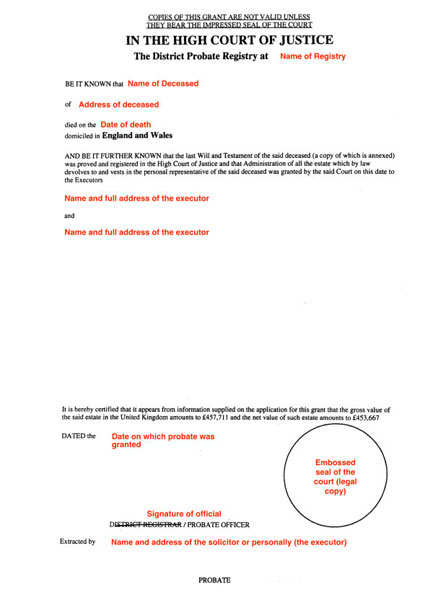What’s the Difference Between Grant of Probate and Letters of Administration?
There is some confusion and misunderstanding about the probate process, so here we will explain the difference between a grant of probate and letters of administration.
When an individual dies their assets including any property that they own, their bank accounts, and all personal possessions that they leave behind are known as their estate. To be able to deal with the deceased’s estate it may be necessary to obtain legal authority from the Probate Registry.
This legal authority that is issued by the Probate Registry is called a Grant of Representation which will allow whoever is dealing with the estate to close bank accounts, cash in investments and to sell or transfer property. The Grant of Representation comes in two different forms – either a Grant of Probate where an individual dies with a valid will or what is known as Letters of Administration, if the individual dies without a will. That is the difference between grant of probate and letters of administration in a nutshell but let’s go on to explain the two terms.
Grant of Probate
A Grant of Probate will only be issued to the executors that are named in the Will. Once the executors have got the Grant of Probate they have the legal power to deal with the estate, and they can start to cash in assets and transfer them to the beneficiaries named in the Will. Some financial institutions may need to see a copy of the Will and the Grant of Probate before they release any funds as they need to be sure that the Will is valid and the named executors are the correct people responsible for dealing with the estate.
The Grant of Probate is legal confirmation that the Will is valid. Once the Grant has been issued, it means that the Will has been officially registered and the executors named in the Will are the only ones who have authority to deal with the estate.

Letters of Administration
Letters of Administration are similar to a Grant of Probate, but are issued instead to the next of kin of an individual who dies without a Will. Letters of Administration is the document issued by the Probate Registry to the administrators authorising them to deal with the estate. The authority to do this is not automatic, and it may be necessary to apply to the Court for Letters of Administration to confirm an entitlement to manage an estate, as there are certain financial institutions that require this.
This can cause problems if, for example, family members cannot agree who would be the best person to deal with the estate. Where there are such disputes, it is normal practise for the Court to get involved, and the financial costs involved in this can soon mount up.
Letters of Administration might also be issued where there is a valid Will, but the Executor named in the Will is not applying for a Grant of Probate. This could be because they do not want to act as executor, are not capable of doing so, or they have already passed away. Where this is the case, it is common for one of the main beneficiaries in the Will to apply for Letters of Administration instead.
Probate Registries
The offices that issue Grants of Probate and Letters of Administration are known as Probate Registries, and there are twelve such offices in England and Wales. The probate registry is responsible for making sure that the will is valid and the applicant is entitled to handle the estate of the deceased.
A probate registry decides the legal validity of a deceased person’s Will and grants its approval, also known as granting probate, to the executors. This acts as proof that the executors have the authority they need to handle the estate of the deceased person.
When making a Will, you should think long and hard about the appointment of your executors. An executor needs to have the capability of managing a potentially complex process that can take a long time to complete.